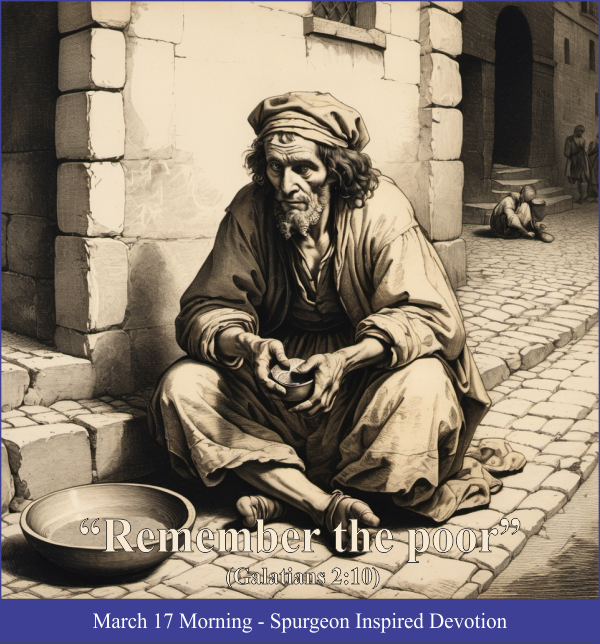
| March 18 Morning Devotion |
|
|
“Remember the poor” (Galatians 2:10) Christ taught His Disciples to give to the poor (John 13:29), as did the Apostles (Galatians 2:10), but this wasn’t to help people who didn’t want to work. The Apostle Paul commanded, “If anyone will not work, neither shall he eat” (2 Thessalonians 3:10), and “if anyone does not provide for his own, and especially for those of his household, he has denied the faith and is worse than an unbeliever” (1 Timothy 5:8). There is no virtue in being poor, but there is virtue in working hard to have enough to give to others who have less. “Let him labor, working with his hands what is good, that he may have something to give him who has need” (Ephesians 4:28). While poverty is not a virtue, it’s less likely to blind sinners to the Kingdom of God than wealth. The Apostles were shocked when Christ said, “it is easier for a camel to go through the eye of a needle than for a rich man to enter the kingdom of God" (Matthew 19:24) because it was commonly thought that people with money were less likely to disobey God’s laws than poor people. This misunderstanding continues today. Christ consistently taught that poor people as more likely to “seek first the kingdom of God and His righteousness” (Matthew 6:33). The reasons are self-evident. Being poor helps you see things from the eternal perspective. "Do not fear, little flock, for it is your Father's good pleasure to give you the kingdom. Sell what you have and give alms; provide yourselves money bags which do not grow old, a treasure in the heavens that does not fail, where no thief approaches nor moth destroys. For where your treasure is, there your heart will be also”. On the other hand, being rich is an obvious stumbling block. “Command those who are rich in this present age not to be haughty, nor to trust in uncertain riches but in the living God ... willing to share, storing up for themselves a good foundation for the time to come, that they may lay hold on eternal life” (1 Timothy 6:17-19). “Now godliness with contentment is great gain ... having food and clothing, with these we shall be content. But those who desire to be rich fall into temptation and a snare, and into many foolish and harmful lusts which drown men in destruction and perdition” (1 Timothy 6:6-9).
|
| 📧Get daily devotionals directly your email box.📧 |
 |